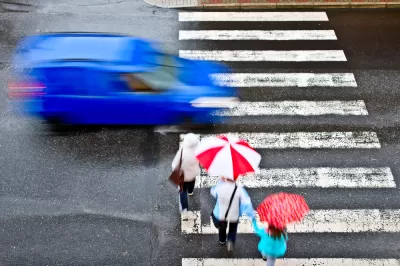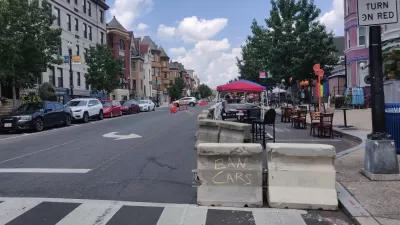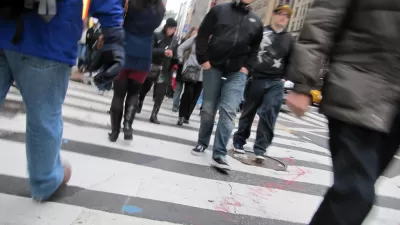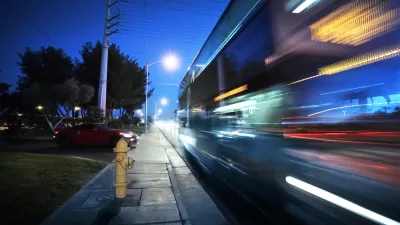Angie Schmitt, former editor at Streetsblog USA, has written a new book about pedestrian fatalities, which works to dispel some of the myths about traffic safety in the United States.

Angie Schmitt's new book, Right of Way: Race, Class, and the Silent Epidemic of Pedestrian Deaths in America, sets out to answer a question to which many people believe they have the right answer: What causes the 50% increase in pedestrian deaths in the last decade, and what can we do to reduce these deaths?
According to Schmitt, most people will point to cell phones. But that's not accurate. "Instead, it’s a convergence of trends: Cars are getting bigger, drivers are going faster, roads are getting wider, and more people are moving to transit-lacking suburbs and Sun Belt cities," writes Alissa Walker. Walker goes on to share the stories of two mothers whose children were killed by drivers in order to illustrate the ways in which race informs the response to such tragic events.
Crashes can be prevented by way of improving crosswalks, the use of medians, and narrowing traffic lanes. "The bigger challenge, Schmitt argues, is addressing the systemic racism built into cities," says Walker. Inherent to the idea of pedestrian safety in the United States is the concept of enforcement. The idea that you can shame or finger wag someone out of engaging in such deadly and dangerous behavior as speeding is simply not true or effective, according to Stockholm official Daniel Firth.
Instead, the United States should follow something closer to Sweden’s Vision Zero program, which prioritizes data and infrastructure redesign to eliminate traffic deaths, suggests Schmitt. Even more importantly, it needs to be a people-centered process to change the fact that, for decades, "transportation decisions have now been made without proper representation from the communities most affected, from local agencies to the government bodies that set the country’s policy agenda," as Walker puts it.
FULL STORY: Walking Is Increasingly Deadly, and Not Because People Are on Their Phones

Study: Maui’s Plan to Convert Vacation Rentals to Long-Term Housing Could Cause Nearly $1 Billion Economic Loss
The plan would reduce visitor accommodation by 25,% resulting in 1,900 jobs lost.

North Texas Transit Leaders Tout Benefits of TOD for Growing Region
At a summit focused on transit-oriented development, policymakers discussed how North Texas’ expanded light rail system can serve as a tool for economic growth.

Using Old Oil and Gas Wells for Green Energy Storage
Penn State researchers have found that repurposing abandoned oil and gas wells for geothermal-assisted compressed-air energy storage can boost efficiency, reduce environmental risks, and support clean energy and job transitions.

Private Donations Propel Early Restoration of Palisades Playground
Los Angeles has secured over $1.3 million in private funding to restore the Pacific Palisades playground months ahead of schedule, creating a modern, accessible space that supports community healing after recent wildfires.

From Blight to Benefit: Early Results From California’s Equitable Cleanup Program
The Equitable Community Revitalization Grant (ECRG) program is reshaping brownfield redevelopment by prioritizing projects in low-income and environmental justice communities, emphasizing equity, transparency, and community benefits.

Planting Relief: Tackling Las Vegas Heat One Tree at a Time
Nevada Plants, a Las Vegas-based nonprofit, is combating the city’s extreme urban heat by giving away trees to residents in underserved neighborhoods, promoting shade, sustainability, and community health.
Urban Design for Planners 1: Software Tools
This six-course series explores essential urban design concepts using open source software and equips planners with the tools they need to participate fully in the urban design process.
Planning for Universal Design
Learn the tools for implementing Universal Design in planning regulations.
Ascent Environmental
Borough of Carlisle
Institute for Housing and Urban Development Studies (IHS)
City of Grandview
Harvard GSD Executive Education
Toledo-Lucas County Plan Commissions
Salt Lake City
NYU Wagner Graduate School of Public Service





























